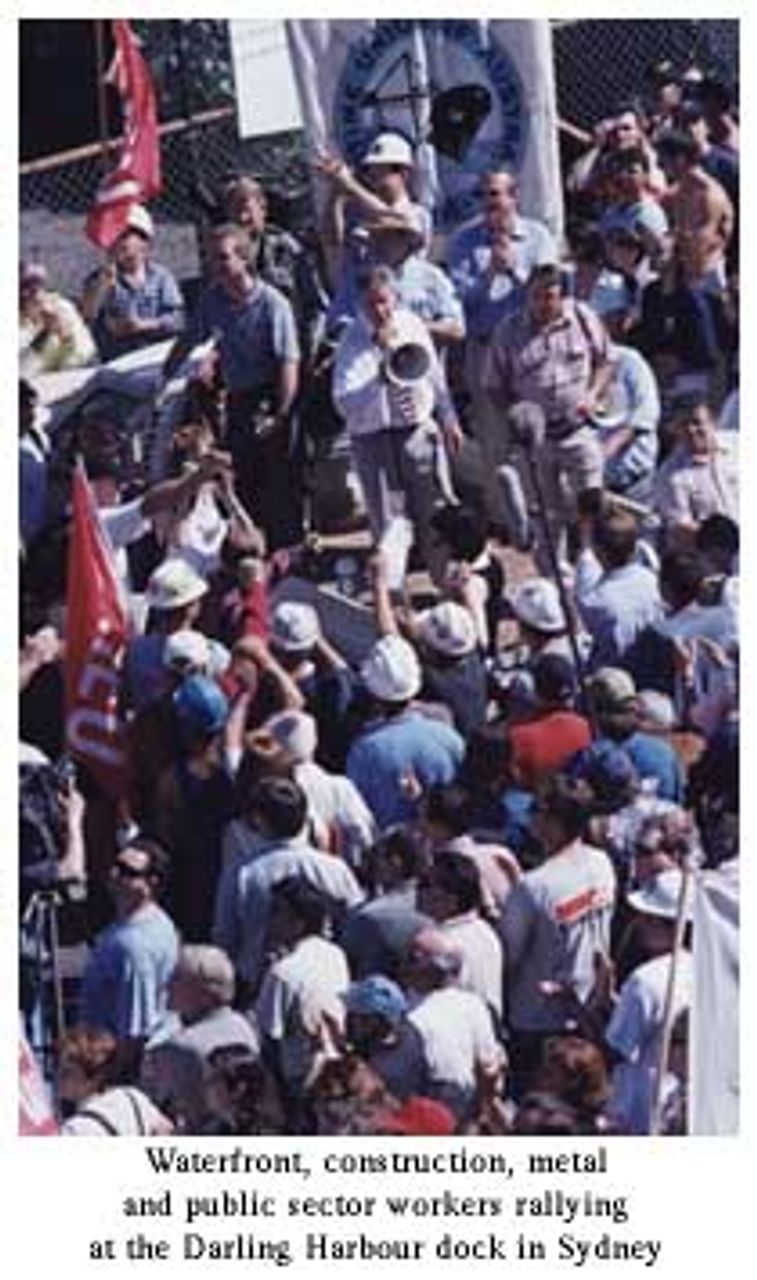Australian union officials quickly sought to contain the anger of thousands of workers in Melbourne and Sydney who protested on Wednesday against the mass sacking of Patrick’s waterside workers.
In Sydney more than 4,500 construction workers, public servants and metal workers marched from Sydney Town Hall to Patrick’s Stevedoring terminal at Darling Harbour. Later, about 300 workers joined sacked wharfies at Patrick’s Port Botany depot. In Melbourne 4,000 construction workers joined a mass picket at Webb Dock, while another 1,000 marched to East Swanston Dock. Metal workers also participated.
 At Darling Harbour officials from the New South Wales Teachers Federation, the Public Service Association, the Communication, Electrical and Plumbers Union, and the Australian Workers Union spoke, but made no calls for united strike action. Instead they instructed their members to return to work.
At Darling Harbour officials from the New South Wales Teachers Federation, the Public Service Association, the Communication, Electrical and Plumbers Union, and the Australian Workers Union spoke, but made no calls for united strike action. Instead they instructed their members to return to work.
At Port Botany, Maritime Union of Australia National Secretary John Coombs attempted to silence criticism of the union leadership. “Don’t listen to anyone who says the ACTU and the MUA leadership have gone soft because they haven’t called a national strike,” he said. “Shout down anyone who puts up an alternative plan, because our plan has worked out all right.”
Sacked dockers, construction workers and others in attendance wanted decisive industrial action. Jake Haub, a Patrick’s worker from Darling Harbour, described the paramilitary operation on Tuesday night: “I was on the ship at 11.10 p.m. when I heard a call, ‘The goons have arrived.’ Although we were expecting this, it came as a shock to see these security goons everywhere.
“There were between 100 and 200 of them, all wearing black trousers and white shirts and at least 12 attack dogs, rotwielers and Alsatians.
“It was a pure military operation, with two people in suits barking out orders like sergeant majors in a battle operation. They took over everything, the admin areas, the first aid and all the machinery. They grabbed keys, demanded people leave the site immediately and said we were no longer employed by Patrick’s.
“This is the sort of thing you see in the movies, or under some extreme right-wing juntas. We claim to be a democratic country, but it’s just two steps away from fascism. It has to be stopped because it is a threat to the whole working class.
“We need total unity by the entire trade union movement and a desire by the ACTU to stiffen its backbone, particularly after opposing action in the oil industry. The AWU members there have said they will support the MUA, so there needs to be clear industrial action.”
Michael Upcroft, married with two children, joined Patrick’s at Port Botany eight months ago. He learnt that he had been fired on the way to work that morning.
“I had no idea the storm was brewing when I got this job. I thought it was secure. Now what do I face? I haven’t been paid for a month and I’ve been told by the government, not my employer, that I’m sacked. I had to call my wife and tell her I’d been sacked. How do they expect us to live?
“I used to work at Kurnell [oil refinery]. I did my apprenticeship as an electrician there. I hope they come out on strike. If I was there now, I would be out on strike supporting this struggle. They’ll be next. If we don’t win this, they’ll attack everybody and then it will really be a two-class society. They want to create slaves, with a super-rich and everybody else in poverty and no rights.”
Tony, a sacked Patrick’s worker in Melbourne, had been working as a substitute for 18 months. That meant he was on call, with no guaranteed income.
“It is like going back to 1929. It’s like going back to serfdom, the way we are being treated,” he said. “Look at the members of parliament, are they on contracts? They all vote themselves whatever superannuation they want—not like workers who only get 5 or 6 percent.
“What is happening here is the drive for profit. We see seamen here jumping ship from countries like Chile and Poland, and they shout out that they are not getting paid at all. The companies give them no money, only their keep while they are working. They are still wearing the filthy clothes they started in. Whoever does that to them probably owns half a Greek island.”
